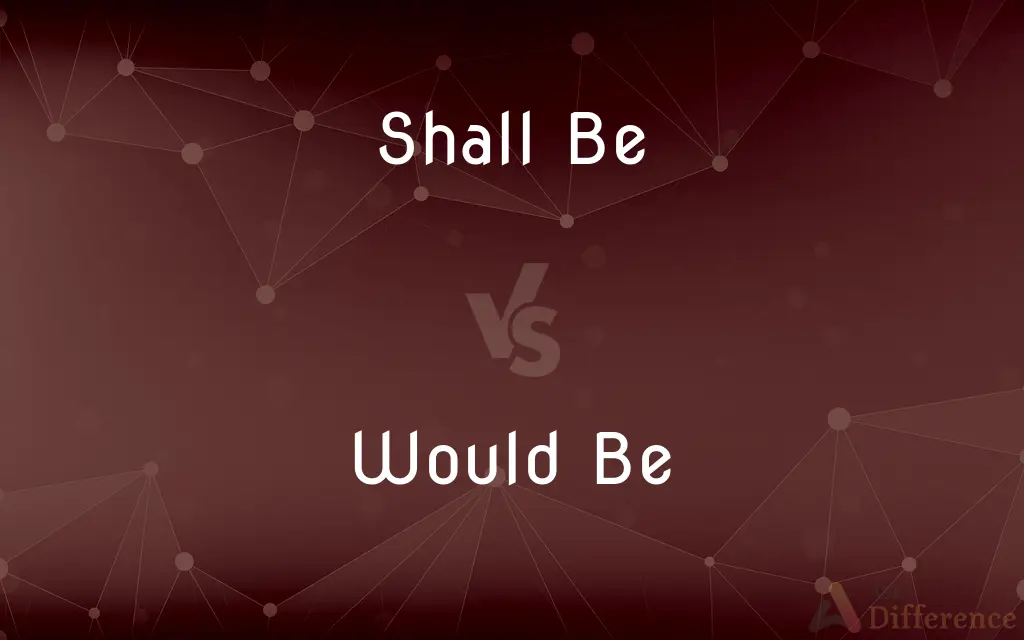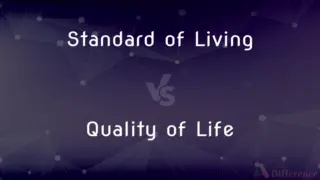Shall Be vs. Would Be — What's the Difference?
By Tayyaba Rehman — Published on October 21, 2023
“Shall be” is typically used to express future actions, often in formal or legal contexts, denoting obligation or requirement, while “would be” is used to denote a conditional or hypothetical situation.

Difference Between Shall Be and Would Be
Table of Contents
ADVERTISEMENT
Key Differences
“Shall be” is generally utilized to express future occurrences, often associated with a sense of determination or obligation, especially in formal, legal, or contractual contexts. It implies a kind of imperative necessity or inevitability about the future action or state being discussed. On the contrary, “would be” is primarily used to depict conditional, hypothetical, or prospective situations, expressing possibilities or speculations, often referring to unfulfilled or unrealized conditions or actions.
For example, in legal documents, “shall be” is often employed to impose a binding obligation, such as “The lessee shall be responsible for all damages.” “Would be,” however, is used to describe a situation that is likely or probable under certain conditions, such as, “It would be nice if we could meet for coffee.” Here, “would be” does not express an obligation but rather a conditional or speculative scenario.
“Shall be” typically represents a more definitive and unequivocal assertion about future actions or states, emphasizing certainty and often carrying a prescriptive or mandatory tone. In contrast, “would be” generally conveys a sense of uncertainty or conditionality, representing actions or states that are contingent upon certain conditions being met and is often used to express polite requests or hypothetical situations.
In grammar, “shall be” is the future tense form of “to be” used with first person pronouns, signaling intention or promise, whereas “would be” is the conditional mood form of “to be,” utilized to depict imagined, wished-for, possible, or expected situations. Understanding the nuanced differences between “shall be” and “would be” is crucial for effective and accurate communication, especially in formal or written contexts.
Comparison Chart
Use
To express future actions or states, often with obligation or determination
To denote conditional, hypothetical, or prospective situations
ADVERTISEMENT
Tone
Formal, definitive, and often mandatory
Conditional, uncertain, and often polite
Context
Often used in legal or formal contexts
Common in everyday, informal speech
Grammatical Mood
Indicative mood, expressing future tense
Conditional mood, expressing unreal, hypothetical conditions
Certainty
Implies a higher degree of certainty
Implies uncertainty or dependence on conditions
Compare with Definitions
Shall Be
“Shall be” is frequently used in formal or legal contexts.
The tenant shall be responsible for any damages incurred during the lease period.
Would Be
“Would be” is used to depict conditional or hypothetical situations.
It would be great to catch up over the weekend.
Shall Be
“Shall be” is used to express certain future actions or states.
The meeting shall be held at 10 am tomorrow.
Would Be
“Would be” often expresses unrealized or unfulfilled conditions.
She would be the perfect candidate for the job if she had more experience.
Shall Be
“Shall be” implies inevitability or determination regarding future occurrences.
The new policy shall be implemented from the next fiscal year.
Would Be
“Would be” is used for polite requests or preferences.
I would be grateful if you could respond promptly.
Shall Be
“Shall be” is typically definitive and unequivocal.
The contract shall be signed by both parties.
Would Be
“Would be” indicates actions or states contingent upon certain conditions.
It would be advisable to check the weather before traveling.
Shall Be
“Shall be” often conveys a sense of obligation or requirement.
The payment shall be made before the delivery of the goods.
Would Be
“Would be” conveys possibilities or speculations.
It would be a surprise if he arrives on time.
Would Be
Desiring, attempting, or professing to be
"Would-be home buyers will have a somewhat easier time getting loans" (Wall Street Journal).
Would Be
Attempting or desiring something.
Would-be marines have to get through a rigorous examination.
Would Be
Unfulfilled; frustrated in realizing a goal, ambition, etc.
Would-be film stars often become waitresses.
Would Be
One who aspires to something.
Would Be
(India) One's fiancé or fiancée.
Would Be
Desiring or professing to be; vainly pretending to be; as, a would-be poet.
Would Be
Seeking advancement or recognition
Would Be
Unfilled or frustrated in realizing an ambition
Common Curiosities
Is “would be” used for polite requests?
Yes, “would be” is frequently used to make polite requests or express preferences.
Is “shall be” formal in tone?
Yes, “shall be” typically carries a formal, definitive, and often mandatory tone.
Is “would be” used for hypothetical situations?
Yes, “would be” is often used to depict conditional, hypothetical, or unrealized situations.
Is “shall be” used for definite future actions?
Yes, “shall be” is typically used to express definite, certain future actions or states.
Can “shall be” imply obligation?
Yes, “shall be” can convey a sense of obligation, especially in legal or formal contexts.
Share Your Discovery

Previous Comparison
Gorilla Glass vs. AMOLED
Next Comparison
Standard of Living vs. Quality of LifeAuthor Spotlight
Written by
Tayyaba RehmanTayyaba Rehman is a distinguished writer, currently serving as a primary contributor to askdifference.com. As a researcher in semantics and etymology, Tayyaba's passion for the complexity of languages and their distinctions has found a perfect home on the platform. Tayyaba delves into the intricacies of language, distinguishing between commonly confused words and phrases, thereby providing clarity for readers worldwide.














































